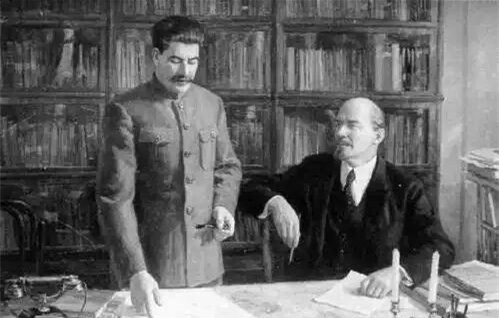Segment 23a: Introduction
23段第一部分,簡介
Although Joseph Stalin was not Lenin's choice as a successor,
盡管約瑟夫·斯大林不是列寧心目中的接班人
he acquired and built up his power over the Soviet Union by playing ruthlessly to Soviet fears.
但他也靠其高壓統(tǒng)治的威懾,掌握并建立了自己的政權(quán)
In Stalin's view, the motherland of Socialism was surrounded on the outside by ruthless capitalists
在斯大林看來,社會主義的故鄉(xiāng)被外界恐怖的資產(chǎn)階級包圍
and threatened from within by class enemies and counter-revolutionaries.
受到了階級敵人以及反革命分子的威脅
Stalin acquired supreme power by playing communist power bosses off against each other
斯大林讓共產(chǎn)黨內(nèi)部內(nèi)訌
and by inventing the cult, as we have already discussed, of the deceased Lenin.
同時又掀起了對已故領(lǐng)導(dǎo)人列寧的個人崇拜,從而坐收漁翁之利,奪取了最高領(lǐng)導(dǎo)權(quán)

Once in power, Stalin dropped the new economic policy, which was too nice,
剛剛掌權(quán)他就廢除了過于理想化的新經(jīng)濟政策
and he installed the dictatorial regime he believed would ensure his goal of socialism in one country.
建立了集權(quán)統(tǒng)治,他認(rèn)為只有這種方法才能確保實現(xiàn)整個國家的社會主義目標(biāo)
Millions of Soviet people paid with their lives for Stalin's priorities.
數(shù)以百萬計的蘇聯(lián)人民為斯大林的統(tǒng)治政策付出了生命
In Segment 23b: Cult of Personality
23段第二部分,個人崇拜
Stalin personally takes control of the Communist Party through desperate planning.
斯大林通過精心的安排奪取了共產(chǎn)黨的領(lǐng)導(dǎo)權(quán)
Because Stalin was neither a great speaker nor a great Marxist theoretician,
斯大林既不是口若懸河的演講家,也不是偉大的馬克思主義理論家
his associates in power, his fellow Bolsheviks, didn't take him very seriously.
他的政治同黨布爾什維克黨并沒有把他當(dāng)回事兒











